:quality(80)/business-review.eu/wp-content/uploads/2023/12/Hires_NEAN4953-scaled.jpg)
Romania’s economy has grown enormously in the last twenty years, as has the standard of living in the country. With the help of foreign investments, which don’t just mean money, but also know-how and technology, Romania is catching up to its European Union peers. But growth must now be intertwined with the transition to a circular and sustainable economy that not only increases purchasing power but also improves life in general, an environmentally friendly society that abandons consumerism in favour of reusage and recycling. This was the main takeaway of the 2023 Foreign Investors Summit hosted by Business Review in November.
By Aurel Dragan
33 years after the Revolution, Romania is a wholly different and much better country, with a strong economy that includes an ever-growing IT&C industry and a modern auto industry. It also has very good prospects for the future, provided that it attracts the available European funds and capital from private investors as well as carries out the reforms included in the PNRR. Road and rail infrastructure have lagged far behind digital infrastructure, and even if digitalization is the future, we need better transport solutions for people and goods, including exports. The lack of infrastructure had been a key issue at the previous two editions of the Foreign Investors Summit. This year, there was less discussion around the topic as many projects are now underway across the country. These projects are largely supported by European money, a component of foreign investment that’s meant to help Romania develop more quickly.
Many of the questions raised by foreign investors are related to developments in Romania’s tax system. The government has already implemented a number of fiscal changes and it has also added some new taxes, which will come into force from the beginning of next year. Companies in the private sector, especially large foreign investors, are not necessarily complaining about the new taxes—aimed at bringing more money to the state budget—, but rather about the fact that the unpredictability strongly affects their plans for the future. Besides, a reform of the tax system is to be publicly discussed next year, as it is a milestone in the PNRR. In the opening speech of the 2023 Foreign Investors Summit, former Prime Minister and current President of the Romanian Senate Nicolae Ciuca gave assurances that no additional tax changes would be made in 2024, and that the reform of the Tax Code would only be carried out following consultation and discussions with the private sector. But Romania will have four rounds of elections next year, which leads us to think that political decision-makers will be busy with other things than the good running of the economy.
Fortunately, we can still say that the country is on the right track, as evidenced by the ongoing process of OECD (Organization for Economic Co-operation and Development) accession, in which we are engaged together with five other countries, with Romania being the best performer in the group, according to Luca Niculescu, State Secretary in the Foreign Affairs Ministry. Joining the OECD wouldn’t only place us among the most developed countries in the world, but it would also confirm the fact that we have responsible authorities and a reliable, stable, and predictable economic system.
An issue that has remained pressing since before the 2020 pandemic, and one that was brought up by almost all participants, was the workforce shortage. Currently, Romania needs people for both highly qualified work as well as blue collar jobs. The demographic situation isn’t helping, as there are too many Romanians who have left the country and too few children. Meanwhile, there too many people—about 1.5 million¬— who are neither in employment nor in education. There are also problems with retraining and continuous education in the blue collar area. Fortunately, some progress has been made on this matter: an increasing number of companies in all fields are getting directly involved in the education of both children and adults. The dual schooling model, which aims to replace the old vocational schools, could solve a problem that’s not just local, but widespread across Europe.
Last but not least, speakers at the 2023 Foreign Investors Summit focused on the circular economy and sustainable business practices. According to the latest World Bank report, Romania is highly vulnerable to the risks of climate change—particularly to floods and drought. Its economy is relatively carbon intensive, at 2.5 times the European Union average. Rising temperatures and an increased frequency of heatwaves pose additional threats to the economy, people, and infrastructure. Romania is on track to achieve its 2030 target of reducing emissions by 55% from 1990 levels. In fact, it already reduced emissions by 53% between 1990 and 2018. However, achieving its pledge of carbon neutrality by 2050 will require substantive and well-coordinated policy action and funding. The investment needed to develop a decarbonised energy sector alone is estimated at USD 356 billion by 2050, representing about 3% of the country’s cumulative GDP over the time horizon. A third of this money should come from the national and EU budgets (USD 115.5 billion), and the remaining USD 240.5 billion from the private sector. Romania needs investments more than ever, and foreign investors will continue to play a crucial role in the country’s development.


Main takes from #FIS2023
Nicolae Ionel Ciuca, President of the Romanian Senate
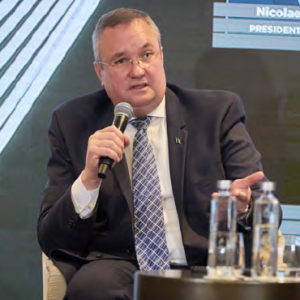
“In 2022, foreign direct investments reached a record level of EUR 11 billion, which clearly denotes the relationship between political decisions, the business environment, and the potential of our country, all under the umbrella of credibility, predictability, and dialogue. It is true that there was a period when we all found ourselves at this confluence of the transition from the covid-19 pandemic to the energy crisis and inflation, but at the same time, rising Romanian interest in the absorption of European funds, through the line generated by the National Plan for Recovery and Resilience, and, of course, the structural funds from 2014-2020. The presence of foreign investors in Romania is very important; we must admit that they are the ones who brought technology, know-how, and a higher level of ambition among the businesspeople in our country. All these measures provided us with a level of economic growth above the European average in 2022, of 4.7%.”
Luca Niculescu, State Secretary in the Foreign Affairs Ministry
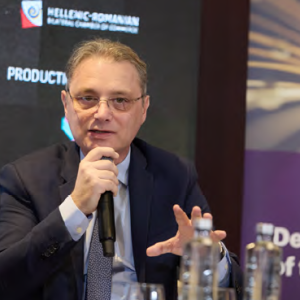
“I would say that OECD accession is Romania’s most important objective at the moment. It may be on the same level with NATO and the European Union, where we are already members, and we want to become members of the OECD because it is the club of economically developed countries, the club of democracies. The OECD includes most developed countries in the world, which are also democratic and have all the three key attributes: trust, stability, and predictability. The process is going well: we have been receiving many evaluation missions, and recommendations will start to come in immediately after these are completed. But at the moment, without revealing too much of the process as it has a dose of confidentiality, Romania is among the countries that are doing the best in this adherence process. There are six countries in total, and the process started on January 25, 2022.”
H.E. Mr Nicolas Warnery, Ambassador of the French Republic in Romania
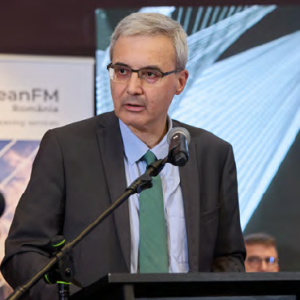
“We’ve got a rich bilateral economic relationship with Romania, and the cooperation between our two economies can be seen in many fields. We see Romania as a privileged economic partner in this part of Europe. More than 4,200 companies with French capital operate here, generating 125,000 jobs. Many French companies had invested in Romania even before it became a member of European Union. So far, we’ve invested EUR 2.5 billion in Romania, across many sectors: industry, trade, banking, insurance, construction, and real estate. And we will continue to do so. Last year, French investment flows to Romania reached EUR 800 million. French companies are happy to contribute to the integration of Romania’s industrial base into European value chains, as we are also involved in building the economy of tomorrow. We are interested in the future and we are here with a long-term perspective. Most French investments in the country are actually reinvestments. Our money doesn’t leave the country.”
H.E. Dr Peer Gebauer, Ambassador of the Federal Republic of Germany in Romania
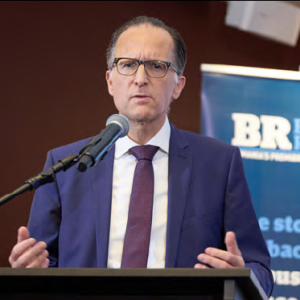
“What we’re seeing now is a trend of nearshoring or homeshoring, with companies bringing their production facilities a bit closer to home. German companies often look at Romania as a prospective production market. The same is true when it comes to divesting from Russia or from Belarus in the wake of the Russian aggression. Companies are looking for other places to do business, and that’s when they tend to look at Romania very closely, because it has proven to be a wonderful place. It’s been a wonderful home for German investments. The areas that I think bear the most potential for future endeavours are energy and defence. We will have great cooperation in these sectors in the future, because as you all know, Romania has so much to offer to companies. I think it’s a great opportunity for us to be able to pursue this type of cooperation.”
H.E. Mrs Sofia Grammata, Ambassador of the Hellenic Republic to Romania
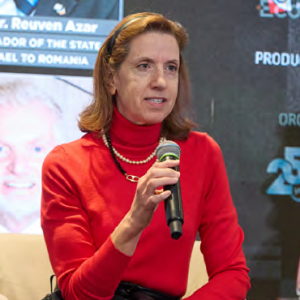
“Romania has always been loved by Greeks. We have been here for centuries. Greek merchants were all around the Black Sea region of Romania since the 7th century BC. And Greeks’ significant interest in Romania continues, becoming more intense every day. Recently we saw the purchase of Enel Romania by the Public Power Corporation from Greece. This is only one of the examples of the growing interest of Greek investors in this beautiful country. You are aware that my country faced a dire economic situation for several years. I’m proud to say that we are back in Romania. One of the advantages of this country for Greek investors is of course the proximity. The distance between Greece and Romania is only a few thousand kilometres. And the tourist flow from Greece to Romania and vice versa is very important. Our friendly relationship and economic and commercial exchanges are a background for very interesting investments.”
H.E. Mr Victor Chirila, Ambassador of the Republic of Moldova in Romania
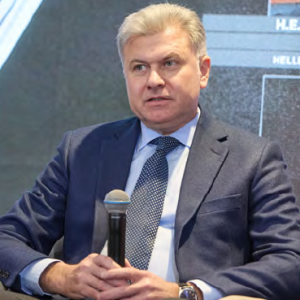
“Romania and the Republic of Moldova were separated for more than four decades after the Second World War, but after the independence we started to rediscover each other and rebuild bridges. After signing the association agreement with the European Union and the CFTA, the so-called deep and comprehensive free trade agreement with the EU, our trade relations boomed and in just one decade the turnover of our trade with Romania increased from one billion to almost three billion euros. There are more than 6,000 companies with Moldovan capital in Romania, which have invested more than EUR 50 million. Also, Romania is the most important investor in our country, with around 300 million euros invested by different companies. Our economies are in the process of being integrated, leading to the creation of a common economic space. To reach that point, we have to reintegrate our infrastructure, and this is going to be a big boost for our economic and trade relations.”
Andreea Voinea,, HR Executive Director at BCR
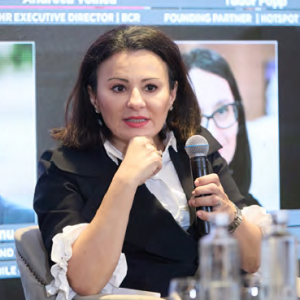
“We should look at the benefits of foreign investments as a whole and at the effect of the vertical integration of foreign investors in Romania. It’s not just about the employment potential of large companies, but about the impact they have on companies, the taxes they pay to local administrations, the development of infrastructure, the improvement of access to essential services, and the improved working conditions for people in local communities. There is also an indirect effect of this impact, on the community side, and it is very important. Multinational companies have a tradition of engaging their own employees in CSR activities and getting involved in local communities. For example, one of BCR’s major programmes is the Money School. We want to play an active role in Romanians’ financial education. 1,100 of our colleagues are volunteers in the Money School and teach financial education. Over 600,000 Romanians have passed through our Money School programmes, and our goal is to reach one million.”
Lucian Enaru, Country General Manager at Schneider Electric
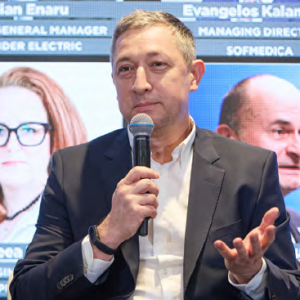
“Schneider Electric is actively involved in the story of sustainability when it comes to technologies that help, such as automation, energy efficiency solutions, and especially services in the energy sector. I think we’re in for a very interesting and challenging period, especially since there is plenty of funding available. There are European funds, state aid, private investments, public investments. And since today we are in an environment where we are talking about foreign investments, I’ve been happy to see foreign investments in Romania recently that not only aim to create new jobs or bring new technologies to the market, but also focus on implementing net zero objectives. Besides the general financing options, there are specific financing schemes available in various industries. We can also see that renewable energy is developing in Romania, and from this point of view, the country has become an attractive regional player.”
Michel Eschenbrenner, CEO at Servier Pharma
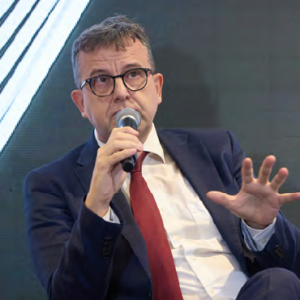
“Servier celebrated its 30th anniversary last year. We opened a representative office here in 1992 and the person who opened it is still with us today. Our company has invested a lot, having evolved from a representative office into a distribution company and a promotion one, so we have two companies in Romania with approximately 280 people, most of whom are doctors and pharmacists. We’ve been investing a lot in our people, many of whom have moved inside the group. Over these 30 years, we have made major investments in our community, supporting programs in education and disease awareness, running clinical trials with our innovative medicines. Our main achievement is that we have a well-adapted portfolio with a wide spectrum in hypertension, cardiology, diabetology and more recent with a new portfolio in oncology. We treat approximately 2 million patients per month, and we are proud to deliver quality to these patients and provide them with the latest available products. We will continue our mission in Romania as innovation saves lives.”
Loredana Chitu, Partner and Head of Capital Markets at Dentons
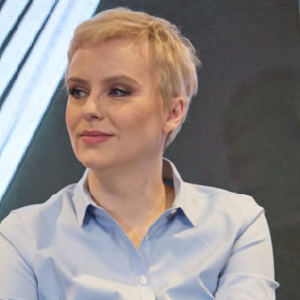
“The sustainable component of investment has become key on capital markets, and not only in recent years, when we’ve been discussing official regulations at the European and national levels, but even before that. Investors have always asked what was the green element of a business, as well as about corporate governance—what does the issuer want, how compliant are they, what plans do they have for the future. This has progressed over time, and now it has turned from a nice-to-have into a must. And in this context, I think it is not a surprise that the largest IPO in Europe this year, which attracted 1.9 billion euros, belonged to a green organisation, namely Hidroelectrica. In the context of a capital market, which is in a slight decline this year, the fact that the company’s business is 100% green has clearly been a plus in the success of its IPO.”
Evangelos Kalamakis, Managing Director at SOFMEDICA
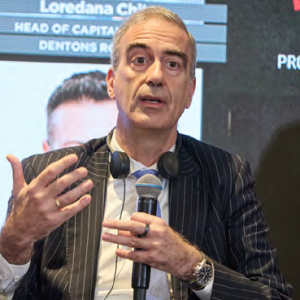
“Sustainable investments are about the long term, about something that withstands the test of time. And to do so, when you plan an investment, you need to be aware of the trade-offs over a longer period. Humans started with fire and burning wood. Then they found dirt coal, then coal, and then oil. What was the benefit every time? Higher thermal density, more energy in a smaller amount of material. That’s why we have prevailed: because we have advanced growth over the long term. But we realised that these solutions also have long-term downsides, such as dirty air, and so we have made a move into green energy, which has less density. Wind power or photovoltaics have smaller thermal density. But we take into account the long-term benefits and costs. And in order to address and incorporate it, we have instituted some corporate governance arrangements through regulation.”
Cristian Nacu, Senior Country Officer Romania at International Finance Corporation
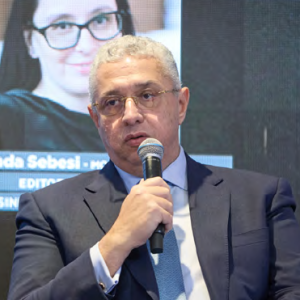
“IFC is the institution within the World Bank Group that finances the private sector and municipalities. In the last 5 years, this activity has grown significantly, and we have financed more than USD 2 billion. Each year breaks a new record. Last year, we carried out projects worth almost USD 550 million. This year, we are already somewhere around USD 800 million, if we also count the money mobilized on projects from other sources. About two thirds of our projects go to the banking and non-banking sectors, because through banks and financial institutions, we are trying to reach SMEs, which we cannot finance directly. The other thirds is going directly to private companies. Here, the biggest contributions or the largest number of projects have been in property management. We have financed projects in office buildings and retail units, as well as deposits and logistics parks. All projects have had a significant impact on the development of the economy.”
Christian von Albrichsfeld, Country Manager at Continental Romania
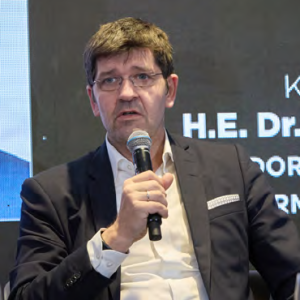
“Recent years have been somewhat special, with unique issues like the pandemic and others. But looking at the Romanian environment, I think we’ve just had the chance to really perform here. And just last year, our growth reached 1,500 new people, after an investment of EUR 180 million. These are topics you don’t often read about in the newspaper, instead there’s much more about companies coming in for the first time. But you should also look at the companies that are already here. I believe in continuous investment in all operations, whether it’s factories, research and development centres or others. This is a topic that just moves Romania forward and we need to pay attention more often instead of only focusing on companies that are just entering the market. We want to hire 200 people in the coming year, but new companies have just employed this number in three months, so they are on the front page.”
Alexandru Reff, Managing Partner at Deloitte Romania & Moldova
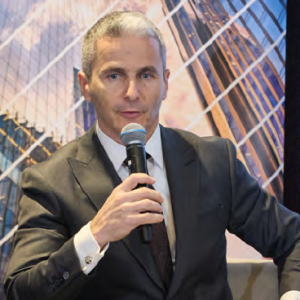
“I found a quasi-consensus in the studies regarding what matters in attracting foreign investors, and it seems that it is not only about predictability and stability, which is the first criterion, but also about the availability of resources, whether we are talking about land, energy or infrastructure such as transport or digital; it is about human capital, which means not only demographics and costs—first of all, it means the adaptation of skills, the ethics of work, and of course, the standard of life and purchasing power; whether we like it or not, countries are also competing with schemes of assistance and support, many of which are very generous – in the United States, cash grants of up to 80% are offered for certain investments, in Europe, since the competitive framework has relaxed, in Germany, for instance, there are subsidies of up to 50% of the volume of foreign investment; last but not least, it is about economic diplomacy, another field in which other countries have been investing consistently for a long time.”
Florin Spataru, State Counsellor in the Prime Minister’s Chancellery
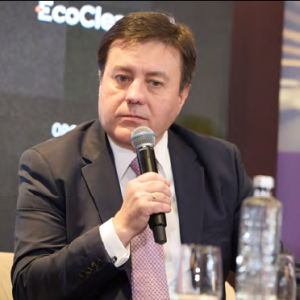
“We have a strategy for the circular economy, which already includes 90 projects supported by the minimis state aid programme the Economy Ministry launched last year. But we must do a lot more, so we will adopt a plan regarding the circular economy, and we will also have to come up with state aid schemes. Economic development is part of the partnership between business and state. The state has demonstrated its capacity to support economic development in times of crisis. The World Bank has evaluated everything related to decarbonisation, what we would need to do to meet our obligations. The price rises to about USD 300 billion by 2050. This is money Romania should attract. Based on a simple calculation, it means that over USD 10 billion should be found in the state budget and from upcoming European funds, but also by attracting foreign investments and spending from the business sector.”
Cristian Preotu, Founder at Le Manoir Group
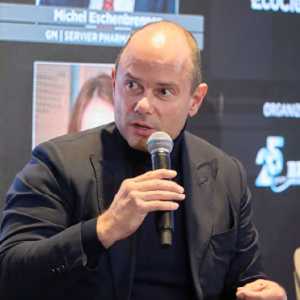
“We are promoting the beautiful art de vivre. We are creating bridges between Romania and France, by bringing wonderful things to Romania and also going the other way around. Several years ago, we opened a shop in Paris, called Le Manoir, where customers can find the best Romanian products. Our goal is to develop quality in Romania and to learn how to appreciate it, how to create it, and how to have a long-term vision about quality. But of course it is a business, we have restaurants, shops, distribution channels, and gifts. In the restaurant business there is quite a big issue with staff—I think this has been the main challenge in recent years. Nevertheless, customers are increasingly interested in the high-quality products we are selling. Our business has been growing every year, naturally, for 20 years, and we are now in a mature state.”
Andreea Nicolae, Managing Partner at PIVOT-C
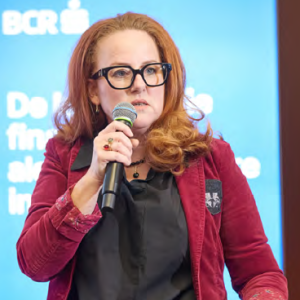
“The question of greenwashing is now up for discussion at the European Commission, and we are waiting for a new directive. It will force organizations into a huge effort to avoid making empty marketing claims that cannot be proven. In other words, you cannot say that your product is eco-friendly without proving it. Speaking of fuels: 1% non-fossil raw material in 99% fossil does not make it your product an eco-friendly solution. The directive might be perceived as a new form of constraint. But it is well-informed and a way to acknowledge the fact that profit should not always be received as the most important and that those sustainability slides we present to investors should be higher up, more accurate and really count in decision-making.”
Ionut Georgescu, Partner Business Review
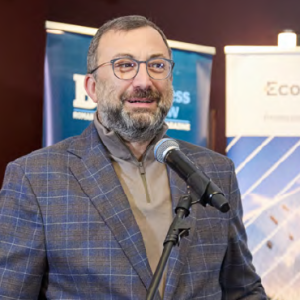
“33 years after the revolution, our country is facing major deficiencies in the quality and quantity of labour, a problem aggravated by the need to import workforce. In this context, serious investments by the private sector in education become a vital necessity for the Romanian economy. We must focus on developing skills, innovation, and entrepreneurial spirit to ensure a sustainable and prosperous future for Romania. The political class and the business environment must now, more than ever, work together to overcome these challenges. At the centre of this collaboration should be the sustainability and circular nature of the economy. It is imperative to establish real partnerships, both inside the private sector as well as between the public and private sectors. Without these synergies, our objectives of sustainable economy and development remain only distant ideals. We must join forces to create an economic environment that respects and values natural resources, while offering equitable opportunities to citizens.”



:quality(80)/business-review.eu/wp-content/uploads/2023/11/Small_NEAN5627.jpg)




:quality(80)/business-review.eu/wp-content/uploads/2024/02/IMG_6951.jpg)

:quality(80)/business-review.eu/wp-content/uploads/2024/04/COVER-1.jpg)



:quality(50)/business-review.eu/wp-content/uploads/2023/11/Small_NEAN5032.jpg)
:quality(50)/business-review.eu/wp-content/uploads/2023/11/SNIPPETS-FIS-2023_LUCA-NICULESCU.jpg)
:quality(50)/business-review.eu/wp-content/uploads/2023/11/SNIPPETS-FIS-2023_sofia-grammata.jpg)
:quality(80)/business-review.eu/wp-content/uploads/2024/04/cover-april.jpg)
:quality(50)/business-review.eu/wp-content/uploads/2024/04/FOT_9989-7-scaled.jpg)
:quality(50)/business-review.eu/wp-content/uploads/2023/08/One-Floreasca-City-2-scaled.jpg)
:quality(50)/business-review.eu/wp-content/uploads/2024/04/ROMTEXTIL-2.jpg)